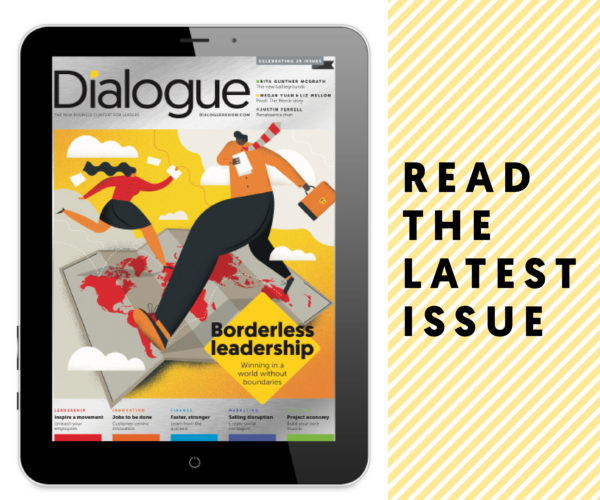Here is what you can expect, from the desk of Dialogue editor, Patrick Woodman
“We live in a borderless world.” Reading that statement, would you regard it as a self-evident truth, or palpable nonsense? A case can be made either way. Today’s ‘metanationals’ span the globe, flying employees where they’re needed, shaping how we consume goods, and wielding huge economic power. More, perhaps, than nation states, which look leaden by comparison.
On the other hand, borders and boundaries have hardly disappeared. The rise of populists pledging to reinforce walls has been a defining trend of recent global politics, and business is not immune from these dynamics. The seemingly unstoppable march of the Western digital giants is halted by China’s walls, while borders have new salience for manufacturers confounded by the possible supply-chain implications of Brexit.
In truth, then, the notion of a borderless world is both right and wrong: it is not an ‘either/or’ question. In fact, either/or thinking is something that leaders need to get away from. As Maarten Asser explains, the most effective leaders are those who are adaptive, embracing apparently contradictory positions. The connection to the ‘firm brand, loosely held’ model – global and local – described by John Davis is clear.
This is precisely why developing borderless leadership is a business-critical priority for executives tasked with getting their organizations ready for what’s next. Leaders have to be capable both of working across national borders and overcoming their organizations’ own internal boundaries. That’s why Megan Yuan and Liz Mellon’s report on pharma giant Merck is so fascinating. Its global leadership development programme is exemplary. That Merck has unleashed a wave of change, challenging the prevailing company culture in unexpected ways, is significant: the capacity of employees to drive change is rarely fully exploited, yet it can be transformative.
That point is brilliantly made by Kate Sweetman and Shane Cragun. A former state-owned Moroccan phosphate exporter hardly sounds like fertile ground for a radical rethinking of leadership, but OCP proves otherwise. This could be the ‘big idea’ of our times. How many leaders dare follow this manifesto for inspiring a movement?
Elsewhere, our new star columnist, Rita Gunther McGrath, warns that yesterday’s strategic tools are poor guides to today’s choices, when disruption is most likely to come from new market entrants. Gary Storer and Beth Ahlering look at leadership in regulated sectors; Suzanne de Janasz and Maury Peiperl call on leaders to keep experimenting; and Terence Tse, Mark Esposito, Olaf Groth and Josh Entsminger warn that the digital barons could make AI serfs of us all.
One quick final word: this issue marks the retirement of our wonderful editorial chair, Liz Mellon. A former professor of organizational behaviour, Liz co-founded Duke Corporate Education’s London office in 2000 before serving as regional managing director for India. Liz was part of Dialogue from the start, and she signs off with a look back at our first 25 issues as well as, fittingly, with the ‘Last word’. Everyone at Dialogue will hugely miss her expertise, insight and creativity. We wish her the very best.

